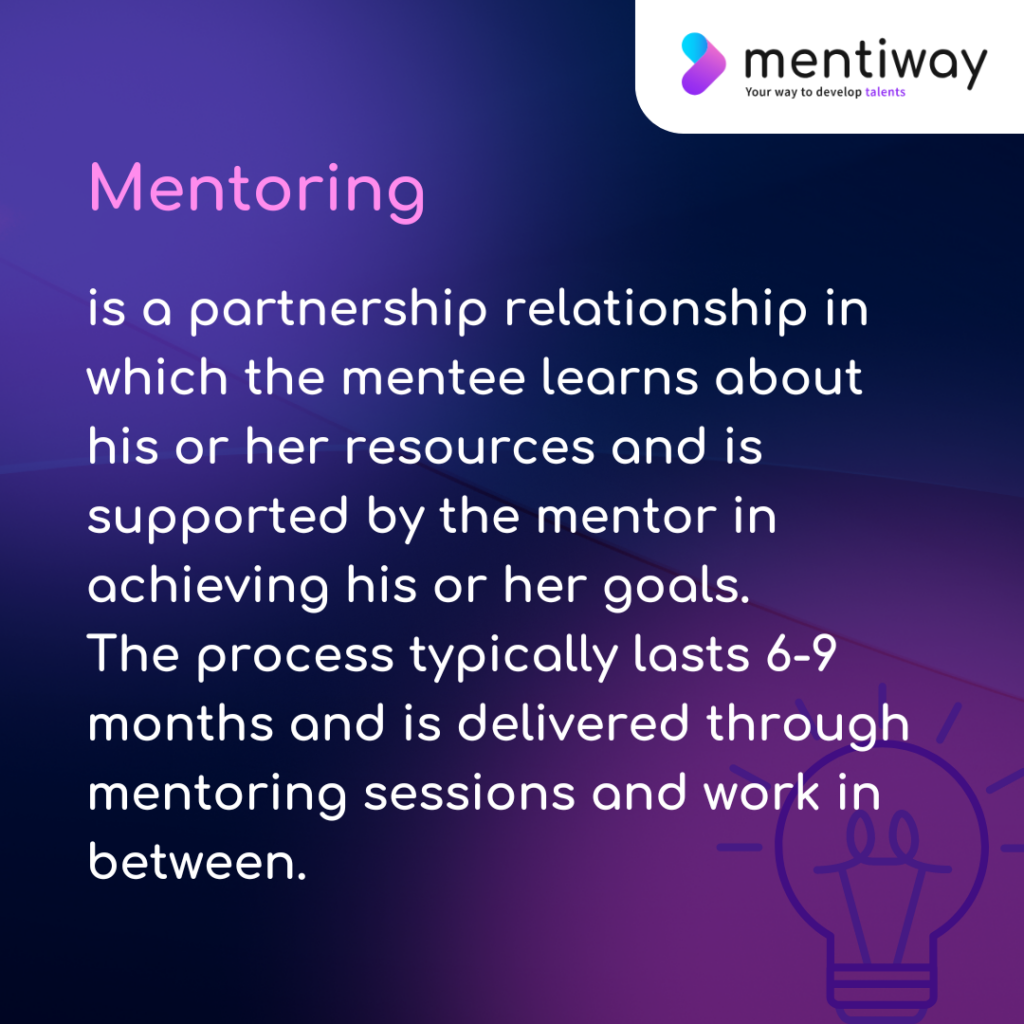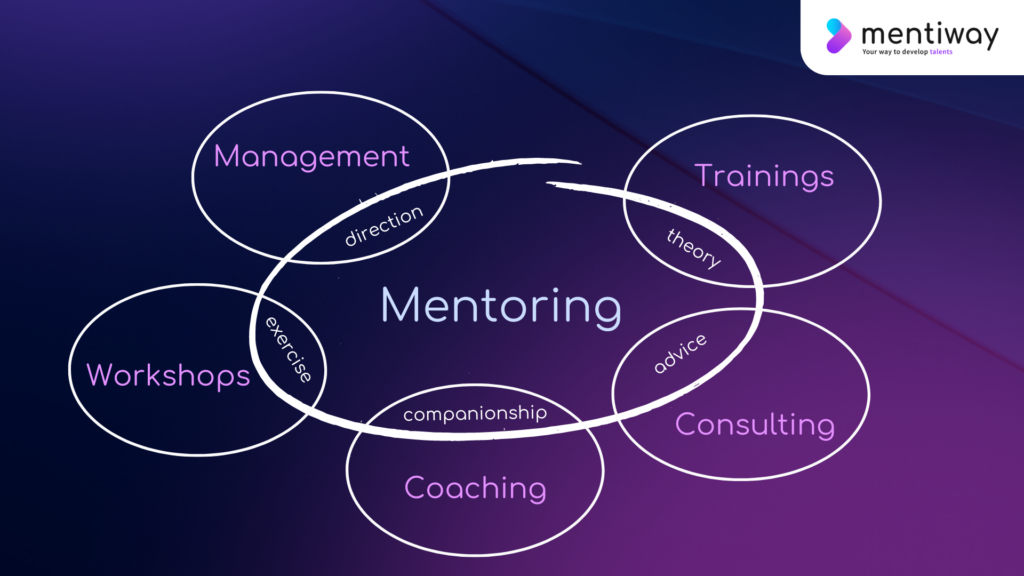What is Mentoring. Definition, examples, mentoring in practice.
Mentoring is one of the most valuable forms of personal and professional development that has been with humanity for centuries in the process of passing knowledge, experience and wisdom from one generation to the next. While the concept of mentoring may seem widely known, it is worth exploring its essence and understanding how it can contribute to the success of both the individual and the organisation.
In this article, we will take a close look at the phenomenon of mentoring, starting with its definition and etymology, to concrete examples and benefits of the practical application of mentoring programmes. We will learn exactly what mentoring is, what purposes it can serve and the various ways in which it can be implemented in today’s world, which is becoming more complex and demanding every day.
Definition of mentoring
Probably everyone instinctively understands what mentoring and mentor are. Mainly the latter word is commonly present in the language, often used, understood simply as an experienced person, advisor or teacher. Mentoring itself is understood as helping someone, giving advice, sharing knowledge.
However, this definition is, on the one hand, very broad and not very specific. On the other hand, mentoring as a type of development activity has already become firmly established in the Learning & Development market. Therefore, it has become necessary to clarify the concept by adding specific principles defining mentoring as more than just helping or sharing knowledge.
Probably the most common definition is the one promoted by the EMCC. According to it: “Mentoring is a learning relationship, involving the sharing of skills, knowledge, and expertise between a mentor and mentee through developmental conversations, experience sharing, and role modelling. The relationship may cover a wide variety of contexts and is an inclusive two-way partnership for mutual learning that values differences.”
This definition, as can be seen, expands teaching itself to include specific techniques – namely developmental conversations, experience sharing and role modelling techniques. In addition, this definition emphasises diversity and its acceptance and even learning from differences.

Of course, there are more definitions in the industry. For the most part, they are similar, differing only in highlighting specific areas relevant to the organisation. For example, the association Promentor defines mentoring as ‘a partnership between mentor and mentee/client, whereby the mentee, supported by the mentor’s knowledge, experience and personality, learns and develops about himself/herself, defining and realising his/her own goals and vision of self in the professional and/or personal area.’
Source: https://www.promentor.pl/czym-jest-mentoring/
As you can see, in this case the Promentor puts the emphasis on the mentee’s own development, building awareness and realising their own goals and visions, where the mentor is ‘just’ a support.
We, as Mentiway, obviously agree with these definitions, with the understanding that for mentoring to actually be effective, two more areas related to structuring and a process approach need to be added:
- any mentoring process must be based on the mentee’s specific development goals,
- should also conclude with a review of these objectives and a joint summary.
Furthermore, for mentoring as an L&D process to be present in companies and organisations, it is also necessary to add a dimension of overall monitoring and evaluation of the process so that business owners of the programmes can assess their effectiveness.
What is mentoring in practice?
In practice, mentoring understood in this way is about organised programmes and opportunities for people who want to share their knowledge and experience (Mentors) to participate with those who want to benefit from this experience (Mentees).
Such processes can take closed or open forms. Closed programmes apply to a limited group of people – for example, employees of a particular company. In open programmes, theoretically anyone can register, but often these programmes are also dedicated to specific audiences – for example, people involved in IT, law or real estate.
Mentoring programmes usually have a beginning and an end, and are organised in annual cycles. They usually open with communication and recruitment of Mentors and Mentees and a series of workshops and training sessions introducing participants to mentoring, but also to industry-specific topics.
Most often, in the case of open programmes, Mentees have to pay a certain fee to participate in the programme – already depending on the specific programme.
Mentoring and coaching
Mentoring shares many characteristics with coaching and is often confused with it. It is therefore also worth pointing out the differences between the two processes.
The differences arise primarily in the roles of Coach and Mentor. Namely, a Coach is a person with whom we learn, and a Mentor is someone from whom we can learn something. In other words, the Coach is supposed to inspire, to highlight the Coachee’s strengths. He or she is supposed to ask difficult questions, provoke thoughts, help to get out of the information bubble. The Mentor, on the other hand, also performs these tasks in part, but is above all a person who has experience in a particular area and shares it with the Mentee.
In addition, the Coach, by virtue of his/her role, must be trained and experienced in the subject of coaching. He/she should be certified and preferably have had as many sessions as possible. A mentor would also be good if he/she knew the relevant coaching techniques, but this is not required to be effective in his/her role.
The domain knowledge mentioned above is also a very important difference. The Coach does not need to know the area in which he will be supporting the Coachee. When coaching, for example, in sales, the Coach does not need to be an outstanding salesman. It is sufficient for him/her to ask questions appropriately and guide the Coachee to develop in this area. The Mentor, on the other hand, should definitely have significantly more knowledge and experience than the Mentee in the subject in which the Mentee wants to develop.
In practice, mentoring is similar to coaching in the role of the coach, who accompanies the mentee in his or her development. In addition, mentoring draws on other forms of development – from workshops, training, consulting or even team management.

Types of mentoring
In addition to the aforementioned division into open and closed mentoring programmes, we can also divide mentoring according to its objectives and the types of competences developed.
- Traditional Mentoring. This is the most common type of mentoring, where an experienced Mentor provides support and advice to a younger or less experienced Mentee.
- Career mentoring. Focuses on professional development. Mentor assists Mentee in defining career goals, career planning and career development decisions. Mostly available at universities within career offices.
- Leadership mentoring. This type of mentoring focuses on developing leadership skills. The mentor helps the Mentee develop leadership skills, team management and strategic decision-making.
- Technical mentoring. Targeted mainly at people working in technical industries. The mentor(s) helps the Mentee to acquire technical skills, solve problems and design solutions.
- Personal development mentoring. Focuses on personal development and soft skills. The mentor helps with confidence building, stress management, interpersonal communication and conflict resolution.
- Intergenerational mentoring. This type of mentoring brings together different age groups. An older Mentor shares his/her experience with a younger Mentee, which can lead to an exchange of perspectives and knowledge.
- Reverse Mentoring. This is another form of intergenerational mentoring in which the younger person is the Mentor and shares knowledge with the older Mentee on, for example, modern technology topics.
- Academic Mentoring. It focuses on the support of students or pupils by experienced Mentors to help them succeed in their education.
- Business mentoring. It is aimed at people who want to start or develop their own business. A mentor with business experience provides support in business planning, strategy and development.
- Social mentoring. Focuses on social support and personal development. Can be used in non-profit organisations where Mentors help Mentees with social adaptation and personal life development.
- Sports mentoring. This type of mentoring is aimed at athletes and can include support with training techniques, sports career development and dealing with pressure.
- Artist Mentoring. It focuses on artistic development, where Mentors help young artists develop their creative skills and advance their artistic careers.
- Parenting mentoring. Help for parents in raising their children. Mentors with experience in parenting provide support and advice on issues related to parenting and child development.
As you can see, there are many different forms of mentoring. There is something for everyone…
Hi, my name is Thomas. I am the Co-Founder of Mentiway. We are happy to share our knowledge and support organisations on their way to success! 💪 If you are interested in how to efficiently and effectively implement a mentoring programme in your organisation using technology:


… so how do you get started as a Mentee?
Those who want to include mentoring in their development have several options.
The first is simply to search for a list of open mentoring programmes in a search engine using queries such as ‘mentoring programme’, ‘mentoring recruitment’, ‘apply as a mentee’, etc. Of course, the recruitment period for most programmes is closed. Of course, the recruitment period for most programmes is closed and it may not be possible to join a programme at any given time. However, there is nothing stopping you from saving a programme and applying when a new recruitment is launched.
The second option is to seek out and join one of today’s many industry organisations and foundations. These organisations very often organise mentoring programmes open to their participants or attendees in addition to their other activities.
A final approach might be to approach your employer (manager or HR team) or your university (usually in the careers office) to ask if they organise mentoring programmes. If not, you can always suggest launching a pilot. A bottom-up initiative and wider interest may prompt companies to launch their own programmes.
Participation in mentoring itself, apart from the specific conditions of the chosen programme, does not require any knowledge or experience. The only requirements are an awareness of what mentoring is and a high level of commitment to your own development.
How to get started as a Mentor
For potential Mentors, the programme search path is similar – as above. With the growing interest in mentoring and the increasing scale of mentoring programmes, organisers increasingly require Mentors to have prior experience in at least one process. Therefore, even before joining, it is worth considering the possibility of broadening your own experience.
The simplest method seems to be to suggest to your employer to organise an internal mentoring and to volunteer as a Mentor. Alternatively, you could look for yourself a Mentee – for example by communicating your willingness to become a Mentor on the intranet.
There are also a number of mentoring schools on the market where you can gain initial knowledge and even become certified in mentoring at a later stage. This can be a certain alternative or complement to participating in the first mentoring processes.
Advantages and disadvantages of mentoring as a form of development
Finally, it is worth noting objectively both the advantages of mentoring, but also the disadvantages or limitations associated with this form of development.
Advantages of mentoring
- Transfer of experience and knowledge. Mentoring allows the transfer of valuable experience and knowledge from experienced employees to younger or less experienced employees. This can reduce the time needed for skills and career development.
- Individual customisation. Mentoring programmes can be tailored to the individual needs of participants. This means that Mentors can focus on a specific area of development, which is more difficult in other forms of training.
- Motivation and engagement. Participation in mentoring can increase employee motivation and engagement. They know that the organisation is investing in their development and see the prospect of promotion.
- Network building. Mentoring allows participants to build valuable professional contacts. Mentors often share their contacts and show participants how to develop a professional network.
There are also a number of case studies, that mention advantages of mentoring programme for companies.
They list, among other:
- improving mental health at work,
- 2x faster promotions of mentored employees,
- three times lower staff turnover,
- savings from reduced turnover of 67%.
Disadvantages of mentoring
- Unbalanced relationships. Mentoring can lead to unbalanced relationships, especially if the Mentor and adept are from different demographic groups (e.g. age, gender). This can lead to a lack of understanding and communication difficulties.
- Lack of standardisation. Unlike training, mentoring is less standardised. Each Mentor-Adept pair may work differently, which can lead to inequalities in employee development.
- Time taken. Mentoring can be time-consuming, both for Mentors and Mentees. It can be difficult to manage in an organisation with a heavy workload.
- Lack of qualifications of Mentors. Not every experienced employee is suitable as a Mentor. Lack of appropriate counselling and teaching skills can lead to ineffective mentoring relationships.
Principles of good mentoring
For the mentoring process to be effective, it is also worth remembering some basic principles. These include:
- Before joining the mentoring programme
- Understanding what mentoring is
- Rethinking one’s own motivation for participating in the process
- Definition of roles, responsibilities and rules of cooperation
- Stepping into the role of Mentee
- Stepping into the role of Mentor
- Contracting the principles of cooperation
- Carrying out the process
- Building a mentoring relationship
- Setting goals for the process
- Keeping objectives in mind
- Evaluation and completion of the process
Hi, my name is Thomas. I am the Co-Founder of Mentiway. We are happy to share our knowledge and support organisations on their way to success! 💪 If you are interested in how to efficiently and effectively implement a mentoring programme in your organisation using technology:








